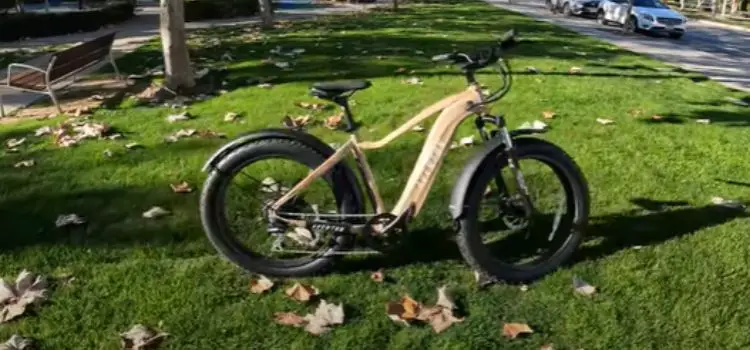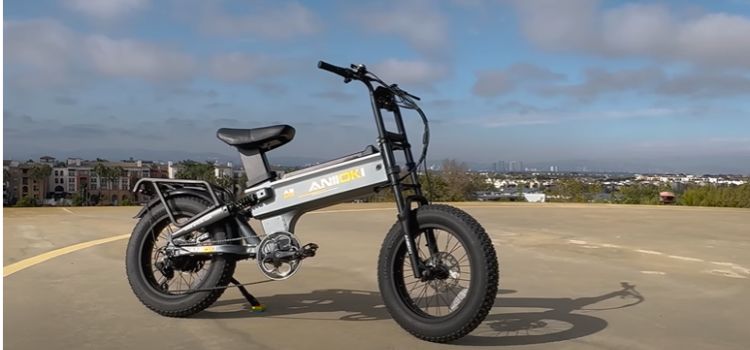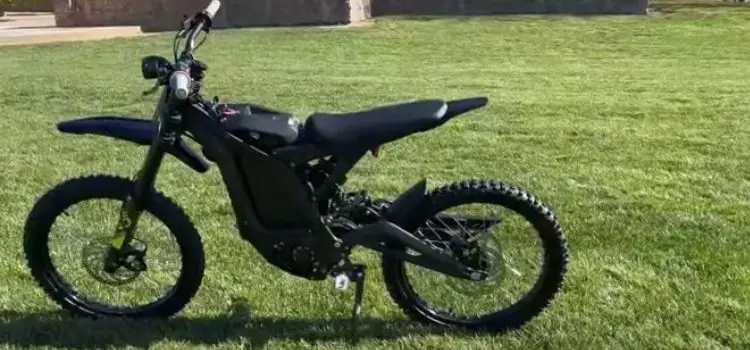Can You Get a DUI on an Electric Bike?
As an Amazon Associate I earn from qualifying purchases.
Electric bikes have emerged as a popular and eco-friendly mode of transportation in recent years. These battery-assisted bicycles offer a convenient and efficient way to commute, providing the benefits of cycling with a little extra power.
However, as e-bikes become more prevalent, questions about their legal status and potential consequences for riders have arisen. One pressing issue is whether you can get a DUI (Driving Under the Influence) while operating an electric bike.
In this comprehensive guide, we’ll explore the legal landscape, potential risks, and evolving attitudes toward e-bikes and DUI laws.

E-Bikes: A New Era of Transportation
Electric bikes have transformed the way we think about urban transportation. With a small electric motor that assists pedaling, they allow riders to cover longer distances with less effort.
E-bikes come in various classes, offering different levels of power and assistance. Many people opt for e-bikes to commute, run errands, or simply enjoy a leisurely ride.
However, as the popularity of e-bikes has grown, the legal framework surrounding them has struggled to keep pace. Understanding the DUI implications for e-bike riders requires a closer look at existing laws, their interpretations, and the attitudes of law enforcement agencies and the judiciary.
Can You Get a DUI on an Electric Bike: The Legal Perspective
The core question is whether e-bikes are considered “motor vehicles” under DUI laws. The answer to this question varies significantly depending on your location. In the United States, for example, each state has its own laws and regulations regarding e-bikes and DUIs. Let’s explore some of the key factors at play.
Classification as a Motor Vehicle
The primary determinant of whether you can be charged with a DUI on an e-bike is whether it is classified as a motor vehicle. In states where e-bikes are explicitly considered motor vehicles, DUI laws typically apply. However, this is not universal, and some jurisdictions make exceptions for e-bikes.
The Role of Speed and Throttle
The distinction between e-bikes and regular bicycles often hinges on the method of propulsion. While regular bicycles rely solely on human power, e-bikes incorporate electric assistance.
In some places, the presence of a throttle, which allows e-bikes to move without pedaling, is a critical factor. The use of a throttle can create the perception that e-bikes are closer to mopeds or scooters than traditional bicycles.
DUI Thresholds and Regulations
The specific blood alcohol content (BAC) thresholds for DUIs can also influence whether e-bike riders can be charged. Some states have a legal limit of 0.08% BAC for motor vehicle DUIs, while others have zero-tolerance policies for minors or for any detectable BAC. The interpretation of these thresholds in the context of e-bike use varies.
State-by-State Variations in DUI Laws for E-Bikes
It’s essential to recognize the substantial differences in how states interpret DUI laws regarding e-bikes. Here are some examples:
California
California defines a “vehicle” in its Vehicle Code Section 670 as a device that can propel a person or property down a highway. However, devices that are exclusively human-powered are excluded. As a result, California allows for DUI charges for individuals operating e-bikes equipped with electric motors. An impaired cyclist on a highway in California can be fined under Vehicle Code Section 21200.5.
Florida
Florida, on the other hand, has classified e-bikes as bicycles, not motorized vehicles. As such, the state does not apply motor vehicle DUI laws to e-bike riders. This distinction is crucial because, unlike many states, Florida does not have a clear definition of e-bikes in its statutes.
New York
New York has recently amended its laws to favor e-bike riders. The state now allows e-bikes to be used for delivery services. However, prior to these changes, New York had been relatively restrictive in regulating e-bike use.
These variations make it crucial for e-bike riders to understand their local laws and consult legal experts when in doubt. Laws surrounding e-bikes are still evolving, and legal interpretations can change over time.
DUI Laws for E-Bikes vs. DUI Laws for Cars
Comparing DUI laws for e-bikes to those for cars reveals several key distinctions:
1. Severity of Penalties
If charged with a DUI on an e-bike, the consequences may be less severe than those for a DUI in a motor vehicle. However, this is not a rule, and penalties can vary depending on the jurisdiction.
2. Testing and Enforcement
Similar to motor vehicles, law enforcement officers can pull over e-bike riders, subject them to field sobriety tests, and conduct breathalyzer tests if they suspect impairment. The presence of a throttle and the rider’s behavior can influence these decisions.
3. Public Perception
One critical aspect to consider is public perception. E-bikes are relatively new on the transportation scene, and some people may view them differently from regular bicycles. The prevailing opinion can influence the attitude of law enforcement, judges, and juries, potentially leading to harsher sentencing within existing legal guidelines.
Penalty Points for Riding an E-Bike While Impaired
In specific regions, being charged with a DUI on an e-bike can lead to the accumulation of penalty points on your driving license. Over time, these points can result in the suspension of your driving privileges.
Florida is an example of a state where e-bike DUI points are applied toward the driving license penalty. Notably, Florida classifies e-bikes as bicycles rather than motorized vehicles.
E-Bike DUI Laws: New and Evolving
E-bike laws are relatively new, and their interpretation is continuously evolving. As a result, riders may find themselves facing charges even if they believe they are adhering to the law. Several factors contribute to the dynamic nature of e-bike DUI regulations:
Legal Cases Testing Boundaries
As e-bike riders face legal charges, their cases may challenge the existing boundaries of current law. These cases can result in legal clarifications and amendments, creating new precedents.
Determining Future Arguments
Legal battles involving e-bikes DUIs also serve to determine the arguments that will be used in future cases. The outcomes of these cases influence how laws are interpreted and enforced.
Varied Enforcement and Public Opinion
The interpretation and enforcement of e-bike DUI laws depend heavily on law enforcement, the judiciary, and public opinion. Inconsistencies can arise due to evolving attitudes toward e-bikes.
Safety Concerns: E-Bike Accidents and Alcohol
The safety of e-bike riders and others on the road is of paramount concern. Although e-bikes are generally considered a safe and environmentally friendly mode of transportation, accidents can occur. Riding an e-bike while impaired can exacerbate these risks. Several key points highlight the safety concerns:
Increased Speed
E-bikes can reach speeds of up to 28 mph, depending on the model and class. Riding an e-bike while impaired means you could be moving at significant speeds, which can lead to accidents and more severe injuries in the event of a crash.
Potential for Pedaling Difficulty
An impairment can affect a rider’s ability to pedal efficiently. Some individuals might rely solely on the throttle, increasing the risk of instability and accidents.
Risk of Collisions
A study comparing accidents involving pedal bikes, e-bikes, and electric scooters found that e-bikes were “more than three times more likely to involve a collision with a pedestrian than either pedal bicycles or powered scooters.” Additionally, e-bike accidents were more likely to result in internal injuries and require hospital admission.
Public Perception
The public’s perception of e-bikes can impact how accidents are perceived. In some cases, e-bike riders may face harsher scrutiny due to the novelty and perceived differences between e-bikes and traditional bicycles.
Wearing a Helmet: A Critical Safety Measure
One essential safety measure for e-bike riders, especially those riding while impaired, is wearing a helmet. Helmets are designed to protect riders in the event of a fall or collision.
In recent years, specialized e-bike helmets have been developed to address the unique safety requirements of e-bike riders. The NTA 8776 standard is one such safety standard that certifies helmets for e-bike use.
These helmets are built to withstand higher-speed impacts than standard bicycle helmets while remaining less bulky than motorcycle helmets.
Deaths Caused by E-Bike Accidents
It is relatively rare to find documented cases where e-bikes are directly involved in fatalities. One such case involved a rider who had modified their e-bike to exceed the local speed limit and was traveling 10 mph over the speed limit of the road.
In this particular case, a pedestrian stepped onto the road without checking for traffic. The rider was ultimately found not guilty of “causing death by careless driving.”
Police Attitudes Toward Electric Bikes
The attitudes of law enforcement agencies and authorities toward e-bikes can vary widely based on the region. In places where bicycles, including e-bikes, are a primary mode of transport, the attitude may be more favorable.
In contrast, regions where larger vehicles dominate may have a different perspective on e-bikes. Some police forces and jurisdictions have adopted forward-thinking approaches to e-bike riders, while others have been more restrictive. Local customs and attitudes play a significant role in shaping these attitudes.
Considering E-Bikes as Safer Alternatives
While the primary focus of this discussion is on the potential consequences of riding an e-bike while impaired, it’s important to highlight the potential advantages of using an e-bike after consuming alcohol, especially when compared to driving a car. It is not an endorsement of riding under the influence, but an exploration of alternative, potentially safer options.
1. Reduced Risk to Others
The slower speeds of e-bikes compared to cars, along with the ability to navigate through traffic more easily, reduce the risk to other road users in the event of an accident.
2. Environmentally Friendly
E-bikes contribute to reducing air pollution and greenhouse gas emissions, making them a sustainable choice for transportation.
3. Personal Health Benefits
Riding an e-bike is an excellent way to stay active and maintain personal health. Combining this with responsible alcohol consumption can lead to a healthier lifestyle.
E-Bike DUI Lawyers: Navigating Legal Complexities
For individuals charged with a DUI on an e-bike, seeking legal representation is essential. The legal complexities surrounding e-bikes and DUI laws can be challenging to navigate, especially given the evolving nature of these laws. Legal experts experienced in e-bike and bicycle law can provide invaluable guidance.
Final Words: The Complex Intersection of E-Bikes and DUI Laws
The legal status of e-bikes and the potential consequences of riding an e-bike while impaired are still evolving. The interpretation and enforcement of DUI laws for e-bikes vary significantly depending on the jurisdiction.
While some regions classify e-bikes as motor vehicles and apply DUI laws accordingly, others make exceptions based on the type of e-bike and its features.
As e-bikes continue to gain popularity, it is crucial for riders to stay informed about local laws and consult legal experts when in doubt. Safety, responsible choices, and adherence to the law should be paramount for all e-bike riders.
Riding an e-bike is a convenient and eco-friendly way to get around, and understanding the legal implications will help ensure a smooth and enjoyable riding experience.
Amazon and the Amazon logo are trademarks of Amazon.com, Inc, or its affiliates.






